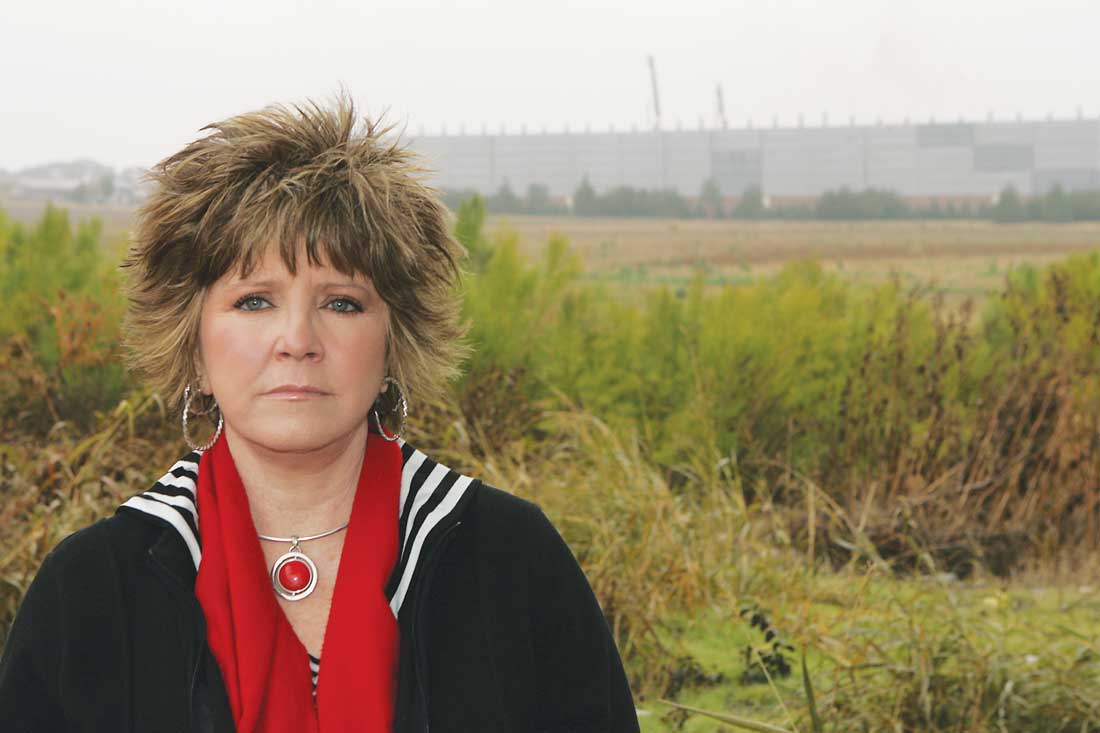A group of Mansfield residents who’ve been pushing for more than a year to strengthen their city’s gas drilling ordinance are finally getting a hearing — of sorts.
However, leaders of the Mansfield Gas Well Awareness Group say the meeting may be stacked against them because the city council member organizing the hearing is a lobbyist for Fort Worth-based Quicksilver Resources, a large gas drilling company.
With almost every home in Mansfield now sitting within a mile of at least two gas wells, the group wants the council to greatly increase the required setback between drill sites and a list of protected land uses; require vapor recovery systems on all new and existing wells; and require electric motors on all gas compressor stations. The measures are an effort to reduce the health threats from the poisonous gases that routinely escape from wells and separator tanks and to minimize noise pollution. The larger setbacks would apply only to new wells and compressor stations and would provide more distance between those facilities and public buildings, residences, schools, day-care centers and commercial buildings.
Awareness Group co-founder Tamera Bounds said that her group has been asking for such a meeting for about a year, but that until quite recently those requests have been met with silence. In fact, the hearing was only scheduled after Bounds’ group and another environmental organization brought a physician to town last month to describe the severe health dangers posed by shale gas drilling.
“A lot has changed since our ordinance was written several years ago,” Bounds said. “There is better technology with vapor recovery systems now than there was years ago, and we want that new technology in place to protect us.”
In late October, Bounds’ group worked with Jim Schermbeck, director of Downwinders At Risk, to bring Dr. Ann Epstein to talk to Mansfield residents. Epstein has been studying the effects from oil and gas exposure as part of her work with the Board of Health in Lubbock, which advises the city on public health risks.
The Oct. 29 meeting drew a surprisingly large crowd of nearly 80 people, including one Mansfield city council member. Epstein’s presentation was videotaped and posted all over the web, including on the Sierra Club’s page and dozens of environmental sites.
“I don’t think the people in the audience really knew about the dangers of gas drilling,” Epstein told Fort Worth Weekly. “They knew there were vapors that were making them sick, but they didn’t realize that benzene, a carcinogen, is directly connected to the drilling and that there is a sound scientific basis for saying that gas wells will have a negative impact on your health.”
Almost immediately following that meeting, the city council scheduled a work session on the issue for Dec. 3.
Mansfield Mayor Dennis Cook said he invited representatives of the Texas Railroad Commission, the Texas Commission on Environmental Quality, the drilling industry, city staff, and the Mansfield Gas Well Awareness Group to speak.
“Each group will get equal time,” said Schermbeck, “which means the citizens will get just 20 percent of the total time allotted and the folks on the side of industry will get the rest.”
He’s angry that council member Stephen Lindsey was put in charge of the work session. “He works as a lobbyist for a gas company to defuse aggressive local gas drilling ordinances and initiatives all over the country,” said Schermbeck, “so it’s clear he wants to blunt the demands of the citizens’ group.”
Lindsey’s official title is director of government relations and community affairs for Quicksilver.
Cook said Monday that the session was his idea and that he is organizing it, not Lindsey.
Lindsey should be “a good source of information based on his experience,” the mayor said. “Quicksilver doesn’t have any business in Mansfield, so I don’t see a conflict. Also I think Steve will be tougher on the gas industry because of his knowledge.”
Schermbeck said that while it’s true that Quicksilver has no wells in Mansfield, Lindsey still has a major conflict of interest. “Lindsey travels the country lobbying cities to adopt the Fort Worth gas ordinance, which allows 600-foot setbacks. That’s what he does for a living,” he said.
Lindsey did not respond to requests for comments for this story.
The Downwinders have been instrumental in helping cities like Dallas and Southlake to write drilling ordinances with setbacks large enough to seriously limit well development. Going even further, Denton recently voted to prevent all future drilling within the city limits.
Lindsey attended one of the Mansfield’s group’s meetings after the one at which Dr. Epstein spoke. According to Bounds, Lindsey told the group that “ ‘We have to work together, not be agitated.’ He told us that if we asked for a setback of 1,500 feet — the same setback that Dallas has — we would be inviting lawsuits.”
Dallas has not yet been sued over its ordinance, which passed in 2013.
Bounds said the work session is heavily weighted against her group and other citizens.
“The RRC and TCEQ are coming to speak. We have already dealt with them, and they are not going to protect us,” she said. “So our focus at the meeting is going to be that we need a city ordinance to protect us — period. And we’ve done our homework. We’ve got video of emissions of poisonous gases; we have pages of documentation of noise violations.
“The question is whether the council will protect the citizens or whether they are just too afraid of industry,” she said.
The Railroad Commission, charged with regulating the oil and gas industry, has gone on record in court as saying that it interprets its duty to “protect the public interest” as protecting the ability of the industry to get oil and gas out of the ground.
More than 200 wells have been drilled in Mansfield, and another 306 have been approved. Current city ordinance requires a 600-foot setback from drill sites to the property lines of protected land uses. That setback can be reduced to 300 feet with the property owner’s permission.
“But if you want to put a new subdivision or school in an area where wells have been permitted, those setbacks are not applicable because the wells were here first,” Bounds said. In those cases, she said, the setback is only 100 feet.
Epstein was not invited to the work session, even though her presentation appears to have precipitated it.
“I think what people need to recognize is what is called the precautionary principle,” she said. “When an activity raises threats of harm to the environment or human health, precautionary measures should be taken even if a cause-and-effect relationship might not be fully established scientifically.”
Newer scientific studies show that oil and gas development is hazardous to human health, Epstein said. “The industry says the connection is not completely proven as yet. The industry wants a level of proof that is suitable for lawsuits, but the level of proof for the precautionary principle is far less than that. They are asking for a standard of proof that is not applicable to human health.”
The real problem, said Bounds, “is that the industry thinks we citizens have such audacity to ask them to put some things on their wells so that we don’t have to breathe their gas fumes and get sick from them. That needs to change.”













Lindsey should be “a good source of information based on his experience,” the mayor said. “Quicksilver doesn’t have any business in Mansfield, so I don’t see a conflict. Also I think Steve will be tougher on the gas industry because of his knowledge.” This would be like putting Charles Manson in charge of the parole board.
After leaving the meeting in Mansfield on October 29th and heading east down Broad Street to 360, we were hit with an odor that almost forced us to drive off the road. It took our breath away and just after listening to Dr. Epstein’s presentation, too, it was frightening to say the least. We have to wonder how often the people of Mansfield must smell these odors ~ and their children, how often are they being exposed to these unknown chemicals wafting through the air. Mansfield needs to fix it, now, before it’s too late and before too many more months and years go by.
Oh, and there are a couple of things in this story…to our knowledge, Downwinders was not involved with the re-writing of the Southlake Gas Drilling Ordinance nor were they involved with the recent fracking ban initiative in Denton. Just wanted to be sure and mention those two items. Thank you so much for this story.
One of many noteworthy details from Dr Epstein’s presentation concerned the number of babies born with Congenital Heart Disease in areas near fracking.
Compared to 0 wells w/in 10 miles:
10% increased risk for 1-3 wells/ mile , low exposure (281 births)
20% increased risk for 4-124 wells/ mile, medium exposure (300 births)
30% increased risk for > 125 wells/ mile, high exposure (355 births)
Read the two presentations by Dr Anne Epstein October 2014
dr._epstein_mansfield_tx_-oct_29_2014_-_health_risks_of_oil_and_gas-_development.pptx
living_with_gas_-_eo_final_10-2014.ppt
Download them from the site http://mansfieldgaswellawareness.weebly.com/inside-mansfield.html
Be sure to ask for vapor recovery units on the storage tanks of padsites AND compressor stations….Having electric compressors is good when the electricity is on, but if we have any black outs, or WHEN the routine (monthy?) maintenance is done, the blowdowns vent directly into the air or is directed to the storage tanks to invisibly vent the blow downs there.
Also don’t forget to have the storm water run off at the padsites be held, tested, and then released. Here are some other things the ordinance should have..https://barnettshalehell.wordpress.com/2014/11/08/responsible-drilling-defined/